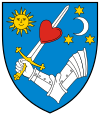Nagyborosnyó
Demographics
The commune has an absolute Székely Hungarian majority. According to the 2002 census, it had a population of 3,074, of whom 95.48% or 2,935 were Hungarian. Ar the 2021 census, Boroșneu Mare had a population of 3,186; of those, 89.96% were Hungarians, 4.05% Roma, and 2.45% Romanians.
Leț
Leț village, which lies on the Dalnic River, had 650 people in 2002, of whom 557 were Székely. It was settled during the Stone Age. Evidence of multicoloured painting has been found which exhibits strong Bulgarian traits. The village was first mentioned in a document of 1333, when it was destroyed by the Mongols. It is the site of the Diet of Lécfalva (25 October 1600), notable for being the first time the word "Unitarian" was used. In 1960, the local manor was demolished.
References
- ^ "Results of the 2020 local elections". Central Electoral Bureau. Retrieved 10 June 2021.
- ^ "Populaţia rezidentă după grupa de vârstă, pe județe și municipii, orașe, comune, la 1 decembrie 2021" (XLS). National Institute of Statistics.
- ^ "Populația rezidentă după grupa de vârstă, pe județe și municipii, orașe, comune, la 1 decembrie 2021" (in Romanian). INSSE. 31 May 2023.
- ^ Gábor Vékony The Prehistory of Transylvania, ch.9
- ^ A. Gordon, Heads of Unitarian History


